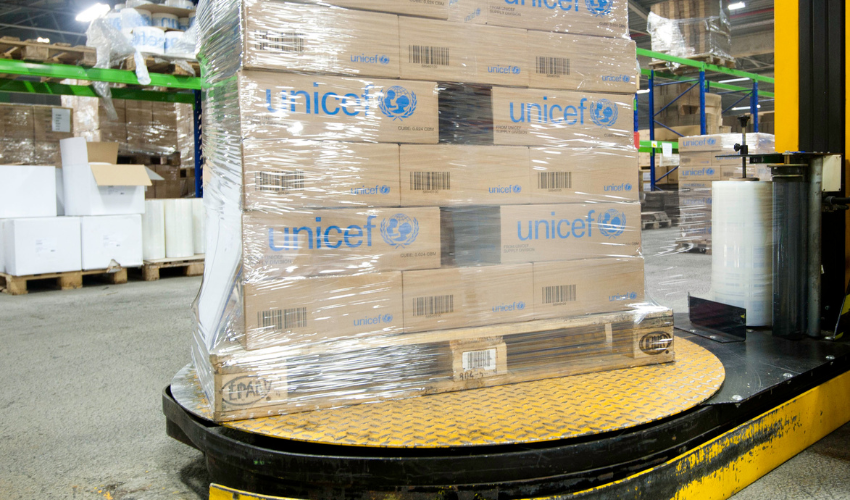
As businesses increasingly prioritize sustainability, finding eco-friendly solutions for pallet stabilization has become essential. Traditional shrink wrap, while effective, poses significant environmental challenges due to its reliance on plastic materials that often end up in landfills. However, a more sustainable version of shrink wrap, such as bundling stretch film, is now available. This alternative maintains the same functionality in securing and stabilizing pallets but is made from recyclable materials, reducing its environmental impact. By making the switch to innovative alternatives, businesses can still meet their packaging needs while minimizing plastic waste. This shift reflects a growing trend toward adopting more sustainable materials and methods, helping companies improve their operational efficiency and contribute to a greener future. This article will explore these eco-friendly options, highlighting how businesses can transition from traditional shrink wrap to more environmentally responsible practices.
In recent years, the push for sustainability has sparked interest in biodegradable and compostable options as viable alternatives to shrink wrap for pallets. These natural materials provide effective solutions for securing pallet loads while minimizing environmental impact. As businesses increasingly seek greener practices, exploring pallet wrap alternatives has become essential for reducing plastic waste and supporting eco-friendly logistics. Understanding these alternatives is crucial for companies looking to enhance their sustainability efforts without compromising on load security or efficiency.
Biodegradable and compostable materials are derived from renewable resources, making them an attractive choice for companies committed to eco-friendly packaging. These alternatives break down naturally over time, reducing waste and pollution.
Choosing natural materials for pallet stabilization offers several advantages that align with the goals of sustainability-focused businesses:
Using alternatives to shrink wrap for pallets not only addresses immediate packaging needs but also contributes to broader environmental goals. By investing in biodegradable and compostable materials, companies can establish themselves as leaders in sustainable practices while meeting the demands of an increasingly eco-aware marketplace. Transitioning to these natural alternatives can significantly reduce the carbon footprint associated with palletizing goods, ultimately benefiting both the planet and the bottom line.
As the call for sustainability intensifies, businesses are increasingly exploring environmentally friendly alternatives to shrink wrap for pallets. These sustainable practices in packaging not only address the need for efficient pallet stabilization but also aim to mitigate the adverse environmental impacts associated with traditional plastic wrapping packaging methods.
Transitioning to sustainable packaging practices involves adopting materials and processes that prioritize environmental health. Companies can consider several strategies when looking for alternative to shrink wrap for pallets:
Adopting environmentally friendly alternatives to shrink wrap for pallets presents several benefits that can significantly lessen a company’s environmental footprint:
Incorporating these environmentally friendly alternatives not only meets the functional requirements of securing pallet loads but also aligns with broader sustainability goals. Businesses that transition to these practices can foster innovation while contributing to a healthier planet. By considering pallet shrink wrap alternatives, companies can effectively demonstrate their commitment to environmental stewardship, which is increasingly important to both consumers and stakeholders. Embracing these sustainable practices not only supports operational efficiency but also positions companies favorably in a market that values eco-friendly initiatives.
As businesses seek effective ways to secure loads while minimizing environmental impact, exploring alternatives to shrink wrap for pallets becomes increasingly important. Several options can provide similar benefits in terms of load stability and protection, each with its own unique characteristics.
When evaluating pallet shrink wrap alternative, it’s essential to consider various types of shrink wrap materials and methods. Below is a comparison of some popular options:
Each of these alternatives offers distinct advantages in load securing:
When considering alternative to shrink wrapping pallets, companies must assess their specific needs, including load types, handling conditions, and sustainability goals. Each option presents unique benefits and challenges that can impact overall effectiveness. By carefully evaluating these alternatives, businesses can optimize their shrink wrap palletizing processes while contributing to a more sustainable future.
As companies strive for more sustainable packaging solutions, identifying effective stretch wrap alternatives to shrink wrap for pallets becomes critical. These alternatives not only help in securing loads but also address environmental concerns associated with traditional plastic usage.
When exploring alternatives to stretch wrap for pallets, several options stand out, each with specific advantages and applications:
Exploring stretch wrap alternatives to shrink wrap for pallets reveals a range of options that cater to diverse packaging needs. Each alternative has unique strengths that can enhance packaging efficiency while supporting sustainability initiatives. By carefully considering these options, businesses can improve their operations while minimizing their environmental impact.
When looking for alternatives to shrink wrapping pallets, there are several effective options to consider. One popular choice is strapping, which involves using durable materials like polypropylene or polyester to secure loads tightly. Strapping is quick to apply and can withstand significant tension, making it ideal for uniform items. Another option is pallet bands, which are elastic bands specifically designed for securing palletized goods. They are easy to use and can accommodate varying load sizes, but they may lose elasticity over time. Reusable pallet wraps made from plastic or fabric are also excellent alternatives, providing a sustainable option that can be used multiple times. Additionally, natural fiber strapping made from materials like jute or hemp is an eco-friendly choice that offers biodegradable properties. Lastly, wooden crates or cardboard boxes can provide effective structural support, particularly for heavier or bulk items. Each alternative comes with its own benefits and drawbacks, so it’s essential to choose one that best suits your specific packaging needs.
Determining the best alternative to shrink wrap largely depends on your specific requirements and environmental considerations. Among the various options, strapping often stands out due to its balance of cost-effectiveness and effectiveness in securing loads. It is particularly beneficial for uniform products and offers a high degree of tension. However, for businesses focused on sustainability, reusable pallet wraps are gaining popularity. These wraps can significantly reduce plastic waste, as they can be used multiple times and offer excellent protection. If biodegradable options are a priority, natural fiber strapping made from jute or hemp is an excellent choice, although its durability may vary. Pallet bands are also notable for their ease of use and versatility across different load sizes. Ultimately, the best alternative to shrink wrap should align with your operational goals, budget, and environmental commitments.
Securing a pallet without plastic wrap can be effectively achieved through various methods. One of the most straightforward techniques is strapping, where heavy-duty straps are used to bind the load securely. This method is especially effective for uniform and stable loads. Another approach is to utilize pallet bands, which can easily wrap around the entire load, providing flexible support while being quick to apply. For those seeking reusable solutions, fabric wraps can be employed; they offer cushioning and are ideal for delicate items. Additionally, using wooden crates or boxes can offer excellent structural support, especially for heavier items. If the products are smaller or can be individually packaged, cardboard boxes provide a practical alternative that is both protective and recyclable. Moreover, pallet adhesives can be used to bond non-uniform items together securely. By selecting the right combination of these methods, you can ensure your pallet remains stable and protected during transport without relying on plastic wrap.

My name is James Thompson, and I’m the editor of this website dedicated to Stretch Film, Pallet Wrap, and Stretch Wrap products.
My passion for packaging began when I noticed the challenges companies face in securing their products efficiently for transportation and storage. This inspired me to delve deep into the world of stretch films and pallet wraps, exploring the latest technologies and best practices.
I aim to provide valuable insights, practical tips, and up-to-date industry trends to assist you in making informed decisions. Whether you’re a small business owner or part of a large corporation, my goal is to support you in optimizing your operations and ensuring your products reach their destination safely.
Thank you for visiting, and I look forward to accompanying you on your journey toward better packaging solutions.
Comments are closed